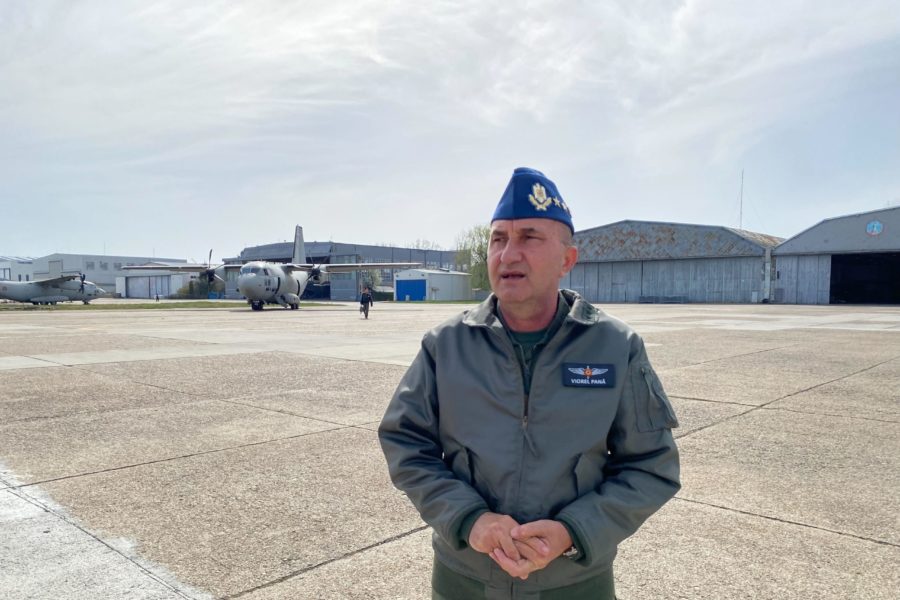OTOPENI AIR BASE, Romania—NATO Air Command pivoted quickly when Russia invaded Ukraine, deploying U.S. assets to conduct enhanced Air Policing in the Black Sea region, where years of investment are now bearing fruit. But Romanian defense officials say that the deterrence mission must change to a permanent defense mission to prevent future Russian aggression.
“We are living a new normal,” Romanian Air Chief Lt. Gen. Viorel Pana told Air Force Magazine during an interview at Otopeni Air Base in Bucharest.
“Even the plans that we have for a confrontation against a peer competitor need to be adapted,” he said while walking the flight line of Romania’s air lift base. “The key word is flexibility.”
To flex muscle in the weeks and days preceding and immediately following Russia’s Feb. 24 invasion of Ukraine, the U.S. repositioned F-15s, F-16s, and F-35s to conduct enhanced Air Policing missions along the eastern flank of NATO, reaching from the Baltics to the Black Sea.
It did not deter Russia in Ukraine, but it has, thus far, kept Russia from striking the former Soviet and Warsaw Pact nations that in December Russian President Vladimir Putin called on to withdraw NATO firepower.
Romanian defense officials who spoke to Air Force Magazine in Bucharest applauded Chairman of the Joint Chiefs Gen. Mark A. Milley’s remarks to Congress proposing rotational troops at permanent Eastern European bases to deter Russia. They argue Russia’s invasion of Ukraine could have been prevented, and with Russia closer than ever to NATO’s southeastern border, only a permanent presence will deter future aggression.
In Romania, the United States, NATO, and Romania have invested tens of millions of dollars in air base infrastructure, training, and exercises to prepare for the type of contingency now playing out. Russia now occupies Ukraine’s Snake Island, located in the Black Sea at the mouth of the Danube River, some 22 miles from Romania’s coast.
Pana said years of close cooperation with the U.S. Air Force has built wing-to-wing trust between American and Romanian aviators.
“The results can be seen in how we are doing things together,” said Pana, reflecting on the quick repositioning of American F-16s, which are flying from multiple air bases across Romania. “They can operate together, do missions together, plan together.”
Pana explained that the U.S. regularly operates from Romania’s air bases, rotating units and doing missions and training. But Romania wants a permanent American presence in order to stop Russia.
“The aim is to translate from forward presence to forward defense,” said State Secretary for Defense Planning Simona Cojocaru, the equivalent of Romania’s deputy minister of defense. “It’s such a leap. And this cannot be done without U.S. support, without the permanent presence.”

In recent weeks, NATO announced the creation of a new battle group to be hosted in Romania, which already hosts command and control centers and the NATO Headquarters Multinational Corps South-East. The Black Sea country is situated just 200 miles from occupied Crimea, home to Russia’s anti-access, area-denial bubble.
Cojocaru said that at the June NATO summit in Madrid, Romania plans to make its case for a brigade-sized NATO presence. An increase in Romanian defense spending to 2.5 percent of GDP, or $1 billion more per year, is proof that Romania is doing its share, she says.
“We are the front runners here on the eastern flank,” Cojocaru said at an interview conducted at Romania’s Ministry of Defense. “The Black Sea today is the focal point for deterrence and defense.”
Local defense experts agree that it is not enough for the U.S. and NATO partners to show their presence in a crisis and then recede.
“If you continue to come like a fireman, only when the fires are rising, you will come back after five years or 10 years because Russia will not change their behavior,” said George Scutaru, a former Romanian parliamentarian who now heads the think tank New Strategy Center, which hosted a defense discussion April 7 in Bucharest with the Washington-based Center for European Policy Analysis (CEPA).
Scutaru pointed to Russian aggression in Georgia in 2008 and Ukraine in 2014, prior to the current crisis, as evidence Russia will strike again if not adequately deterred.
“What is necessary? To have another war in Georgia or to [have fighting in] Moldova to come back?” he posed when asked why the U.S. should maintain a permanent presence in Romania. “It’s necessary to be here.”
